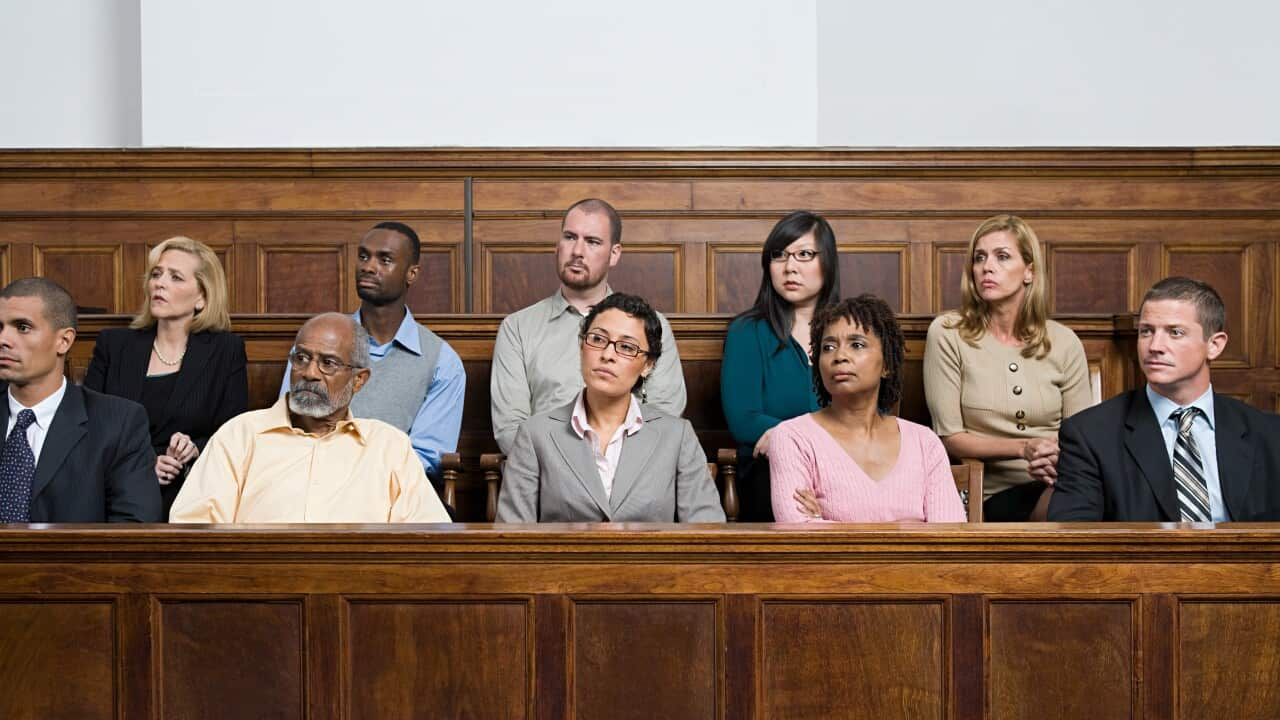Key points
- The Lehrmann trial ended earlier in the week when the chief justice found one juror had been conducting their own research.
- Experts say jurors need to be better informed and allowed to ask more questions in court.
Content warning: Contains descriptions of sexual abuse.
The resources that go into a trial in an Australian court can be immense, but it can take something as simple as a juror doing some ‘Googling’ for proceedings to fall apart.
Juries are expected to make their decision only on the evidence given in court, and nothing else.
The trial of Bruce Lehrmann for the alleged rape of Brittany Higgins was aborted earlier in the week when the chief justice found one juror had been conducting their own research and had brought research material into the jury room.
But this was not the first time a jury has been dismissed for something like this, and a case has had to start afresh in a new trial.
Here are some other cases that proved controversial.
The ouija board
A trial in England in 1994 made headlines when, a month after the accused was convicted of murdering a husband and wife, it was revealed that some of those on the jury had consulted a ouija board about the case during deliberations.
University of Melbourne law Professor Jeremy Gans, who wrote a book about the incident, admits it sounds like it’s a story that had been made up.

Jeremy Gans, Professor of Law at the University of Melbourne. Source: Supplied
"Who killed you?" one of the jurors reportedly asked the "spirit".
The jury went onto convict the accused man.
Professor Gans said one of the jurors who wasn't part of the seance went to their solicitor and eventually to the defence solicitor and explained what had happened. The UK Supreme Court then ordered a new trial.
He said while the case was often put up as one of the worst examples of jury behaviour, he did not believe that the ouija board incident had played a role in the jury’s decision to convict the accused.
"My conclusion in the book was that they weren't using the Ouija board to deliberate, they were just letting off steam basically, in a very awful, unpleasant murder trial.
"And while it's sort of a tasteless thing to do — and you can see why people get concerned about it — chances were, it wasn't something they were actually using [to come to a verdict].”
The photographer
In an opinion piece published on the Australian Lawyers Alliance website, lawyer Peter Schmidt described jurors who 'play detective' as 'the scourge of the courtroom.'
He detailed a case in an Adelaide court in 2019 where a man’s child sex abuse conviction was quashed and a retrial ordered due to juror misconduct.
"It was discovered that one of the jurors had visited the crime scene and taken a photo,” Mr Schmidt explained.
“The judge was informed that a juror had photographed the scene of the alleged sexual assault and shown the pictures to three fellow jurors.”
Mr Schmidt wrote that the juror’s decision to investigate the crime scene jeopardised the entire case and such “improper behaviour” not only caused unnecessary cost and burden to the court system, but that the victim would have to go through the trauma of giving evidence again.
Visit the alleged crime scene
Professor Gans, however, said members of the jury who did their own research often had good intentions.
He said jurors such as those who saw the initial trial of the accused killer of Sydney model Caroline Byrne aborted back in 2008, were often just trying to make sure they made an informed decision around the verdict.
The judge found that members of the jury had planned to visit the site where the woman’s body had been found.
They had reportedly wanted to go to The Gap at night time to see what the conditions would have been like when the incident being investigated had occurred.
“This is a jury playing detective where I think very understandably - but nevertheless, definitely wrong - jurors think ‘I want to get the right answer’ and in this case, ‘I’m going to do some detective work of my own,’" Proffesor Gans said.
“They're frustrated, they want to do the right job in this case, so they go just do a bit of what anyone would do in a really important situation, they look into it themselves.”
While initially convicted for Ms Byrne's death, Gordon Wood was acquitted of the murder as part of the appeals process.
Interpreting the rules
Professor Gans said even curiosity sparked by a topic raised in a trial could be enough to change the course of a case.
He brought up a case where convictions for sexual offences against children were quashed in the because of jury misconduct.
“Part of the issues in the case were about whether a defendant had a working with children check or not, and the juror was just interested, 'I wonder when you need a working with children check’ and it wasn't because it mattered in the case, no, everyone agreed this didn't matter at all at trial,” he said.
“The problem was that was a breach of the NSW rules on looking things up, so there needs to be another trial.”
In other cases, jurors may have breached the rules but courts have decided to continue on with a case despite the fact.
“It's not entirely consistent and a lot turns on the attitude of the parties. So the prosecution, the defence and the judge when it's first discovered, sometimes they just shrug and go, this is a small thing we'll press on,” Professor Gan said.
Associate Professor in Law at Monash University, Jacqui Horan wrote about this in her book, Juries in the 21st Century.
In a trial relating to the deaths of Kathleen Folbig’s children, a case which is still the subject of inquiries today, jurors were found to have obtained information outside of the court.
One juror shared the results of an internet search of the defendant’s history with fellow jurors and another had shared advice given by a nurse friend about medical matters pertaining to the case.
“Whilst the jury behaviour was irregular, the material arising from the irregularities was not in the circumstances deemed to be highly prejudicial and the appeal was dismissed,” Associate Professor Horan wrote.
Is it that hard to stick to the rules?
Sanctions for jury misconduct are in place in some jurisdictions which means jurors can be fined or could even face a jail term for breaching court directions.
Associate Professor Horan said while the judge in the Lehrmann case had said they had told the jury not to do research a total of 17 times, there is a disjuncture between court trials and everyday life.
“It's instinctive, particularly for younger jurors to do research,” she said.
So there is that disjuncture, between what jurors want and the old style of how trials have been run in the 20th century, and I think we need to change things.”
Associate Professor Horan believes to avoid jurors doing their own research outside of trials, they should be given more opportunities to ask questions in the courtroom.

Monash University's Associate Professor Jacqui Horan. Source: Supplied
“It’s more like things like, don't look up things about the witnesses, don't look up things about the law, don’t look up things about these proceedings, and this juror [in the Lehrmann case] didn’t actually do any of that, they just looked up some general stuff about how sexual assaults are talked about or with or dealt with generally.”
If you or someone you know is impacted by sexual assault, call 1800RESPECT on 1800 737 732 or visit . In an emergency, call 000.
Readers seeking information or support relating to sexual abuse can contact Bravehearts on 1800 272 831 or Blue Knot on 1300 657 380.











